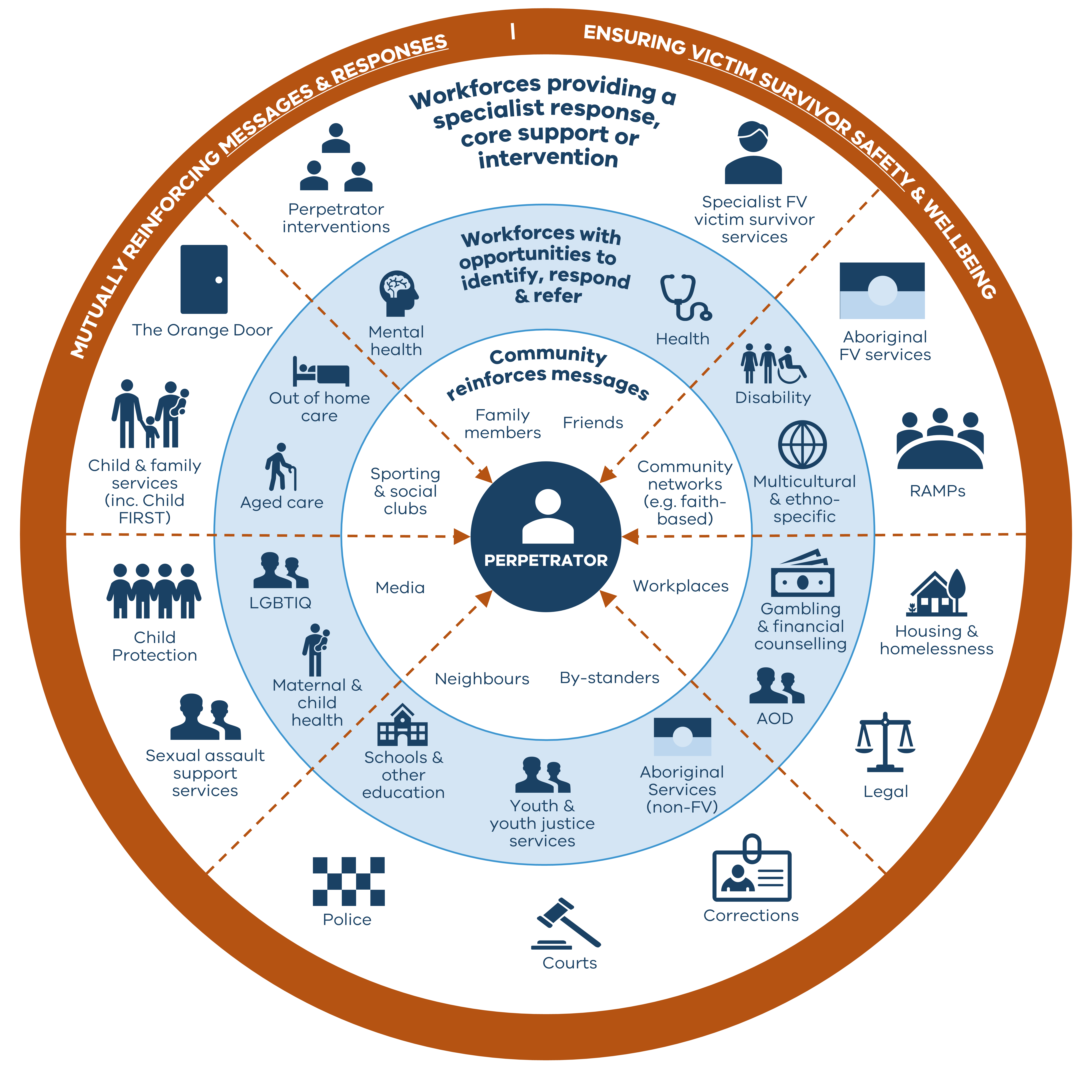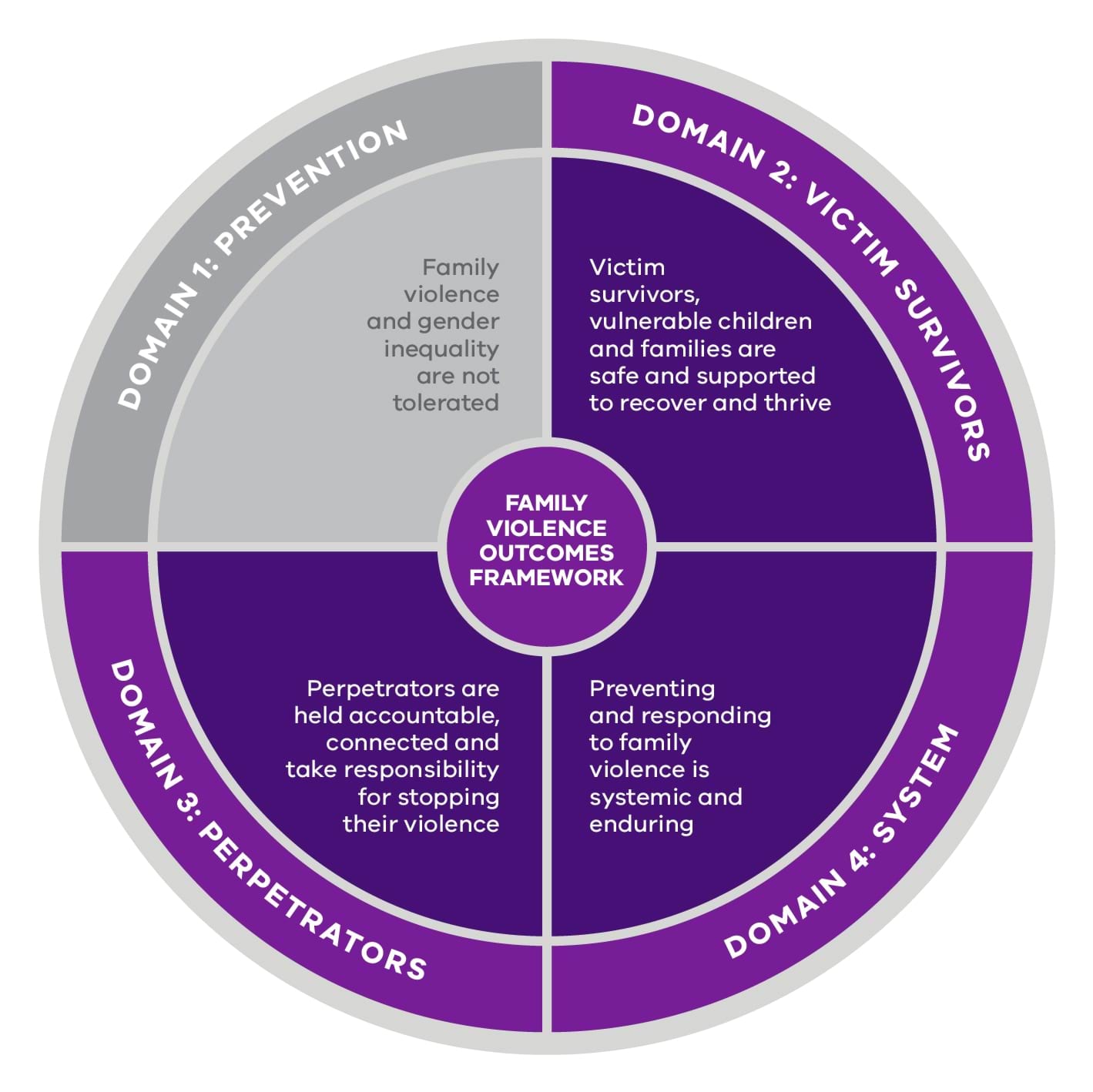Building momentum
To make a real and tangible difference to the safety and wellbeing of victim survivors, the many agencies and services that interact with perpetrators need to work together as part of an integrated system with a shared understanding of purpose.
Every time a person who uses violence interacts with the service system, there is an opportunity to affect behaviour change and intervene.
Behaviour change is more likely to happen when the government, the broader service system, community and society are working together to prevent violence happening and intervene early when it does. This creates a web of accountability that:
- centres on victim survivors and keeps women and children safe
- stops perpetrators from committing further violence
- holds them to account
- keeps them in view
- supports them to change their behaviour and attitudes
...to increase the accountability of family violence perpetrators (we) must shift the burden away from victim survivors who have had to bear responsibility for action for far too long...
While much of the family violence system has a long-standing role of keeping perpetrators in view, fully establishing an effective web of accountability will take time. It requires continuing cultural change across the whole service system, to tilt the focus of reform to the perpetrator.
This ongoing shift will increasingly be reflected in our approach to reform delivery in areas such as:
- The Family Violence Multi-Agency Risk Assessment and Management Framework (MARAM) and information sharing
- The Orange Door network
- Victoria Police operational reforms
- Justice and community-based perpetrator programs
- Dhelk Dja initiatives focused on people who use violence
- Central Information Point
- Specialist Family Violence Courts
Acknowledging Aboriginal terminology
‘People who use violence’ is the preferred term used by some Aboriginal people and communities, recognising that the term ‘perpetrator’ can create a barrier to engagement with people who use violence.
Aboriginal-led prevention and response work with people who use violence is guided by frameworks such as ‘Nargneit Birrang’, the Aboriginal holistic healing framework for family violence. These approaches acknowledge the impact of intergenerational trauma, colonisation and racism, and the need for healing to be incorporated into behaviour change programs.
In this video, Uncle talks about ways that people who are angry and frustrated can calm down when they feel overwhelmed: how to manage the build-up of tension and to think differently about triggers. Uncle also suggests ways that family members can help others to avoid explosive conflict.
Courtesy of East Gippsland Dhelk Dja Action GroupAdolescents who use violence
Adolescent family violence is a distinct and complex form of family violence requiring a differentiated, whole of family response that is developed and trauma informed.
Information about how the family violence reform is responding to the needs of adolescents who use family violence, is discussed in the Children and Young People page of the Rolling Action Plan.
Progress since 2016
We have strengthened and broadened the intervention system, by working together with agencies and services that interact with perpetrators and people who use violence.
Developing a new approach to perpetrators
In 2016, the Expert Advisory Committee on Perpetrator Interventions (EACPI) was established in response to the Royal Commission into Family Violence. The EACPI was asked to consider how to increase the accountability of perpetrators and shift the burden away from victim survivors.
EACPI’s final report and recommendations are informing our whole-of-system approach to perpetrator accountability.
The key activities for perpetrators and people who use violence which have been delivered since the Royal Commission are grouped here into five areas.
Delivery to 2023
We will work with our sector partners, to draw on the experiences of perpetrators and people who use violence, to progress these reform activities.
Responding to the vision and intent of the Expert Advisory Committee on Perpetrator Interventions (EACPI), activities are grouped under three themes for this work program over the next three years:
- Enhanced service responses
- Cultural safety and inclusion
- Enablers
Our program reflects both perpetrator-specific activity and broader actions across the reform that supports the aims of this priority.
1. Enhanced service responses
2. Cultural safety and inclusion
3. Enablers
Connecting perpetrators and people who use violence across the reform
Activities in this priority area support, and are equally supported by, delivery more broadly across the family violence reform.
Reform-wide priorities
Activities to keep perpetrators accountable, connected and responsible for stopping their violence are informed by our reform-wide priorities of intersectionality, Aboriginal self-determination and lived experience.
Intersectionality
The strategic priorities of the Everybody Matters: Inclusion and Equity Statement are being progressively applied across perpetrator interventions.
This will strengthen existing and emerging perpetrator interventions – in line with EACPI’s recommendations – so that they meet the needs of all perpetrators, including those from culturally diverse backgrounds, those with disabilities, and those from the LGBTIQ+ community. This aligns with EACPI’s findings that certain cohorts of perpetrators do not have access to appropriate services.
The Family Violence Multi Agency Risk Assessment and Management Framework (MARAM) and perpetrator-focused practice guides will address intersectionality and trauma-informed practice when responding to perpetrator risks and/or needs.
We are building an evidence base from our trials of new interventions to help us design and deliver tailored services for people who use violence who:
- are fathers / parents
- have alcohol and other substance abuse issues
- have a mental illness
- have cognitive impairment
- are women who use force
We are also building an evidence base from our trials of new interventions to help us design and deliver tailored services for people who use violence against:
- Aboriginal people and communities
- people from culturally diverse communities
- people who are LGBTIQ+
- older people
- people with a cognitive impairment or disability
Activities in this priority area which support delivery of the reform through an intersectional lens are reflected in the Progress since 2016 and Delivery to 2023 content on this page.
inTouch
inTouch Multicultural Centre Against Family Violence (inTouch) provide integrated, culturally responsive services to migrant and refugee communities.
inTouch is funded to deliver the Motivation for Change program, which supports men from migrant and refugee communities who use violence towards family members. This program includes intensive group work and one-on-one case management support for participants to learn ways to relate to people without using violence.
Aboriginal self-determination
We will continue to support advancement of self-determination through partnerships with Aboriginal organisations and community in accordance with the vision and guiding principles of the Dhelk Dja Agreement and Nargneit Birrang.
Dhelk Dja is the only enduring Aboriginal-led strategy to address family violence in the country and consultations like this give Aboriginal People voice...
Activities relating to people who use violence and which support Aboriginal self-determination are reflected in the Progress since 2016 content and in the actions set out in Delivery to 2023 on this page
Lived experience
Strategic engagement is being strengthened at Family Safety Victoria to ensure the voices of lived experience and their experience of the service system are reflected in policy development and service design, including in the design and delivery of perpetrator programs and interventions.
The Victim Survivors’ Advisory Council is supporting development of the perpetrator work program, including the development of the Family Violence Outcomes Framework and theory of change for perpetrator accountability.
The Orange Door network statewide concept and service model has been designed using input from people with lived experience, including perpetrators and people who have used violence and have accessed behaviour change programs.
A data collection process to better understand and measure peoples’ experience has been introduced to collect feedback from all clients, including people who have used violence, to understand their experience of The Orange Door network.
Measuring outcomes
Family Violence Outcomes Framework
The perpetrator domain of the Family Violence Outcomes Framework has been refreshed in 2020, to include a more holistic approach to perpetrator accountability and greater scope for therapeutic and non-punitive responses to perpetrators and people who use violence.
Delivering the activities for this priority area will likely have the greatest impact in achieving outcomes against the following domains:
Royal Commission recommendations
The Victorian Government has committed to implement all 227 recommendations from the Royal Commission into Family Violence.
Of the recommendations still in progress, six relate to perpetrators and people who use violence.
Updated

